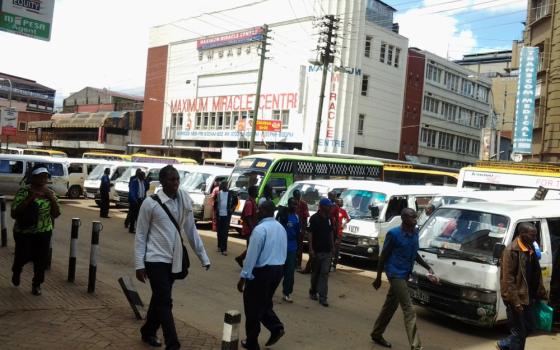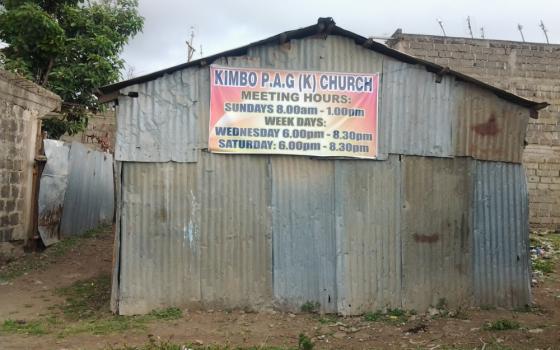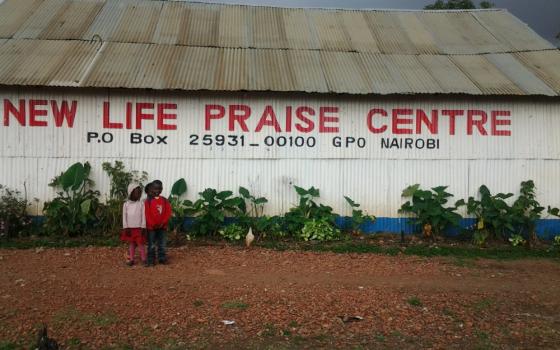I couldn’t help but nod in total agreement as I read an article by Fr. Daniel Ihunnia, MSP, entitled “Breaking the Evil Yoke: A Challenge for Mission Theology in Africa.”
It reads in part:
In many religious circles around the continent of Africa, ‘casting out demons’ is a common practice. The finger of the devils must be fished out. Healing and deliverance are known to have been part of the function of religion in Africa. Hence, in a land of disintegration, danger, disease and poverty, independent religious groups act as places of refuge and wholeness. It is not surprising then that, when people feel something is wrong in their life, they quickly blame it on the bad spirits, and the next step is to seek ‘deliverance’ from those Christian groups who claim they can do it.
A majority of the Kenyan people have fallen prey to this, and chances are they do not intend to change in the near future, as long as good medical care is beyond their reach, as long as they can afford only one meal a day, as long as jobs are nowhere to be found despite people’s having an education. They are faced with myriad challenges in life so that they easily give in to what we call in Kenya “fake pastors,” who deceive them and persuade them they are cleansing them of their bewitchment. All these predicaments have left them with only one option of seeking God’s intervention in the face of hard economic times.
It is only at a church podium that the pastors enjoy maximum immunity: Nobody has a right to question the claim, “Just do as instructed and all will be well with you.” This is a fact that the unscrupulous pastors are aware of, and they use the platform to exploit their followers for their own selfish agendas, often with a very convincing spiritual and emotional language.
Scenes of fake pastors attracting large crowds are common on our TV screens. It is little wonder that, even on our buses from Nairobi to any part of the country, near and far, men and women posing as pastors bombard passengers with “preaching,” which is often preceded by a scriptural reading that is carefully chosen to suit the present condition of the people. They preach what people want to hear, and then comes the time to “sow a seed,” meaning to donate some money. Each day you travel to any part of the country, there are always new faces of preachers. One persistent question is, “Who among them is authentic?”
I watched in disbelief an interview of one pastor, Victor Kanyari, on NTV’s “Churchill Show,” which airs here on Sunday nights. Kanyari is a charismatic personality and a secondary school dropout who speaks persuasively in a cobbled combination of English and native languages. He is in the business of promising miracles. Following are translated extracts from the show:
Churchill: Is it true after being exposed you will be coming back on air live?
Kanyari: Yes, very soon. If I am a criminal, I would be in jail by now.
Why do you ask for 310 shillings [U.S. $3.41] before performing any miracle?
It is in the Bible. Malachi 3:10. [“Bring the whole tithe into the storehouse, that there may be food in my house. Test me in this,” says the Lord Almighty, “and see if I will not throw open the floodgates of heaven and pour out so much blessing that there will not be room enough to store it.”]
It is said you touch women’s breasts during your healing sessions.
Yes, if a woman says she has been diagnosed with breast cancer, which other part do you want me to touch, other than the breast?
What is the biggest offering you have ever received?
The biggest offer? Six million [Kenyan shillings, or $66,000. He continues in Swahili]: The man said he had been healed through my prayers. After selling a piece of land in Karen, Nairobi, he donated to me 6 million. I bought a piece of land and put up a school for the physically challenged.
This pair of shoes you are wearing . . .
Everything I am wearing I bought outside Kenya – overseas through seed money.
What is your last word to Kenyans concerning your church – Salvation Healing Ministry?
We all have haters. If you believe in me, come to my church and sow the seed. But I do not force anyone.
______
Many Kenyans are outraged that Kanyari targets the poor; 42 percent of the nation’s of 44 million people live below the poverty line, and many are desperate and willing to pay some fees to get the aid he promises. Since Kanyari claims he is able to cure every sickness, from HIV/AIDS to cancer and childlessness, this explains why the poor will go to any extent to pay Kanyari the amount he demands.
He explained to journalist Njoki Chege of The Daily Nation in an interview that on a good day after paying his bills he pockets 500,000 shillings [$5,500]. You can now understand where the money comes from to purchase an expensive Range Rover, which he proudly said is from “seed money,” adding that he doesn’t force anybody to tithe.
Some fake pastors have been caught on camera coaching people to pose as though miracles have happened to them, after which the “blessed” pocket huge sums of money. But heaven broke loose when some hopefuls were not paid the agreed-upon amount and turned against the pastors and exposed them to the public. This has not helped much because people still go to the same churches and make the loudest noise in defense of the pastors.
Who is to blame? Is it the pastors and their churches or the government for allowing such malpractice? All religious institutions in Kenya are supposed to register with the government, but the process described by church leaders is lax. The church leaders say the government should not control or regulate them since this will interfere with the freedom of worship. At the same time, neither the church nor the government is able to tame the wayward pastors who are spoiling the name of the genuine churches. Of course, the church leaders have no authority to enforce standards or stop the malpractice.
But why are Kenyans so easily lured to these churches and their inflated promises? Hopping from one church to another in search of miracles can never be a solution to the many challenges faced by the poor people of Kenya.
Miracles are around us every day. When I was young, I prayed to God that I touch the hearts of thousands positively through the use of the media. Honestly, the results I witness each day are tremendous. Members of my radio audience call, they send text messages, they come in person – just to say, “Thank you.”
One lady confessed, “I had an unforgiving heart. After listening to you speak about forgiveness, it was like you were seeing and speaking to me directly. I wept. That week did not end, I forgave them all. I had no idea I was carrying a heavy load. Since then I feel light.”
Which other miracle should I go in search of? At one time, I got used to hearing, “Are you the Sr. Adelaide?” To me, these are more than miracles; that a little prayer I made to God at that tender age he is answering today beyond all imagination. Unbelievable!
There are miracles around us all the time. All we have to do is open our eyes and our minds to appreciate them and not to wait to walk on deep waters or to fly high in the sky.
Which is your miracle to which you are grateful to God?
[Adelaide Ndilu is a Sister of the Immaculate Heart of Mary and the administrator of Radio Waumini in Nairobi, Kenya.]



